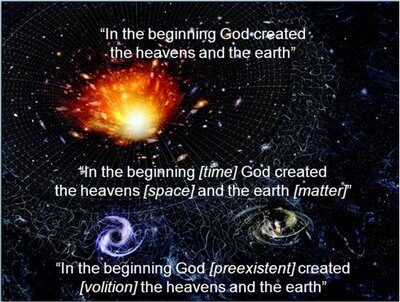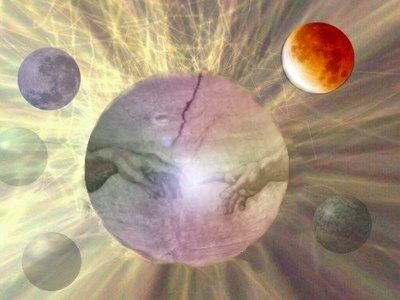This segment of True Freethinker’s essay which considers natural theology, or general revelation, will consider The God of the Bible.
The God of the Bible Let us begin considering whether the God of the Bible passes the test of natural theology / general revelation by reviewing the inferences drawn from nature. We will then consider monotheism, polytheism, henotheism, pantheism and deism.
The universe has a cause and the cause is:
1) Timeless / eternal.2) Spaceless / unlimited by spatial dimensions / not restricted by locality / omnipresent.3) Immaterial / non-physical / without extension in space / spirit.4) Uncaused.5) Necessary / non-contingent.6) Volitional / self-conscious / personal.
7) Highly intelligent / omniscient / omnipotent.
All of the above characteristics are applicable to the God of the Bible as evidenced by one single verse. The characteristics are not solely found in one verse but the fact that they are found in one verse is very telling and in fact, more telling due to the fact that the verse is the very first one in the Bible:
In the beginning God created the heavens and the earth
Let us consider the verse thusly,
In the beginning [time] God created the heavens [space] and the earth [matter]
Let us further consider it thusly,
In the beginning [time] God [a preexistent being outside of time, space and matter] created [volitionally caused to come into being fine-tuned and infused with energy] the heavens and the earth
1) Timeless: since God preexisted time.2) Spaceless: since God preexisted space.3) Immaterial: since God preexisted matter.4) Uncaused: since God existed before time which is a requirement for cause and effect relationships.
5) Necessary: since without God nothing would exist and since God is the first cause to which we regress in a finite regress of contingency.
6) Volitional: since God created.7) Intelligent: since God created a rational, explorable, fine-tuned universe.Now, let us consider which god belief, whether polytheism, henotheism, pantheism, deism or monotheism pass the test (I am considering these to be succinctly representative of various other god beliefs).Polytheism: many gods, let us say two or more.Henotheism: basically polytheism but hold that only one of the many gods should be worshipped.Pantheism: God is everything, or is in everything.Deism: a vague concept of god as a creator who created the universe and then let it run its course. This god does not interact with the universe, miraculously, nor does it have relationships with humans.Monotheism: one theistic God (strict of Trinitarian).Polytheism and henotheism are excluded because since there are many gods no one of them is the absolute, complete or ultimate creator god. Since they are separate beings they each must possess something that the others do not posses-each lacking.Pantheism is excluded because god would be making itself subject to time, space and matter and would not be creating creatures but would end up having relationships with itself.Deism is excluded because as far as we know God does interact with the universe and creatures. God interacts with the universe since, as far as we know based on a century and a half of experimentation, life does not come from non-life (abiogenesis).God interacts with creatures since the history of humanity is saturated with reports of God performing miracles and having personal interactions. While some of these reports are surely erroneous the only way to exclude each and every one of them regardless of chronology, geography or theology, would be to presuppose deism or atheism and thus, that they must, by necessity, be erroneous. Yet, this is begging the question.Monotheism seems to pass the test. It also seems reasonable to consider it as it is expressed by the Abrahamic faiths: Judaism, Christianity and Islam.Judaism and Islam hold to strict monotheism while Christianity holds to Trinitarian monotheism.Judaism’s and Islam’s theology may have at least two problems: their gods may lack something and there is a problem in the realm of morality. Being strictly monotheistic gods an argument that could be made against them is that they may have created humans (and angels and animals) because they lacked something, namely relationships.Let us take a moment to state that the gods of Judaism and Christianity are the same God yet, fully revealed in Christian theology. Let us therefore focus on Islam’s god for a moment.This particular god, being single and solitary from all eternity, is not a personal being or rather, not a personable being. Since it lacks eternal relationships it either created beings in order to have relationships with them or, as is more obvious in Islam’s theology, it is simply not interested in having personal relationships with humans.Moreover, since it lacks eternal relations and does not seek personal relations its moral system amounts to arbitrary dogmatic assertions. This particular god is commonly referred to as “capricious.” Since relation is not intrinsic to its nature, neither is morality.
When we consider the God of the Bible-the God of Judaism as fully revealed in Christian theology-we find a being that is one God in three “persons” who are coeternal, coexisting and coequal, one what and three whos as it has been stated.1
This God is not alone in eternity and is thus not lacking relation. Relation is intrinsic to this God and so is morality (or rather, ethics, the very ethos), it is a very aspect of God’s nature or character. Thus, this God’s ordained morality is neither arbitrary nor some external entity to which God is subject.
Let us consider various theologies and see which are excluded by natural theology: Hinduism, Buddhism, Taoism, Shinto, Judaism, Christianity, Islam and why not mention New Age, Wicca, Atheism as alternative worldview-style options.
Hinduism: ranges from pantheism to polytheism.Buddhism: atheistic.Taoism: atheistic or pantheistic.Shinto: polytheistic.Judaism: strict monotheism.Christianity: Trinitarian monotheism.Islam: strict monotheism.New Age: pantheistic.Wicca: pantheistic or polytheistic.
Atheism: speaks for itself.
Since natural theology points up toward a theistic creator the only options not excluded are the theistic theologies of Judaism, Christianity and Islam. Of these, Judaism is, even by its own admission of expecting the future revelation of the Messiah, an incomplete theology. Islam built its theology by fallaciously borrowing from and theologically and historically contradicting Judaism and Christianity (see here). Thus, Christianity is the only viable option left. …since the creation of the world Hisinvisible attributes are clearly seen,being understood by the things thatare made, even His eternalpower and Godhead-Romans 1:20


